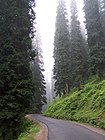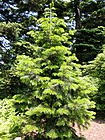Note: This is a project under development. The articles on this wiki are just being initiated and broadly incomplete. You can Help creating new pages.
Abies webbiana - Talispatra
Abies pindrow are a genus of 48–56 species of evergreen coniferous trees in the family Pinaceae. They are found through much of North and Central America, Europe, Asia, and North Africa, occurring in mountains over most of the range.
Uses
Fever, Painkiller, Pain of menses, Terpenoids, Swelling, Catarrhal, Urinary bladder, Diarrhoea, Sore throats
Parts Used
Chemical Composition
The oils were characterized by a high content of monoterpenoids (68.9%-79.9%), mainly comprised by limonene (21.0%-34.4%), camphene (0.5%-19.9%), alpha-pinene (13.8%-16.8%), myrcene (6.7%-8.3%) and beta-pinene (6.5%-8.6%)[1]
Common names
| Language | Common name |
|---|---|
| Kannada | Talispatri |
| Hindi | Himorinda, Rai, Span |
| Malayalam | Taleesaptram |
| Tamil | Talispatri |
| Telugu | Talispatri |
| Marathi | NA |
| Gujarathi | NA |
| Punjabi | NA |
| Kashmiri | NA |
| Sanskrit | Dhatripatra, Manduparani, Sukodara, Talisa, Talisapatra |
| English | Himalayan silver |
Properties
Reference: Dravya - Substance, Rasa - Taste, Guna - Qualities, Veerya - Potency, Vipaka - Post-digesion effect, Karma - Pharmacological activity, Prabhava - Therepeutics.
Dravya
Rasa
Tikta (Bitter), Madhura (Sweet)
Guna
Laghu (Light), Teekshna
Veerya
Ushna
Vipaka
Katu (Pungent)
Karma
Kapha, Vata
Prabhava
Habit
Identification
Leaf
| Kind | Shape | Feature |
|---|---|---|
| Simple | Needles | Leaves spiral, 2‑4 cm long, upper surface grooved, dark green, shiny. |
Flower
| Type | Size | Color and composition | Stamen | More information |
|---|---|---|---|---|
| Unisexual | Many | Male cones 1‑2 cm long, axillary, ellipsoid, reddish‑green; microsporophyll with ‑2 linear sporangia; microspores winged. Female cones 8‑12 cm long, solitary or in pairs, narrowly oblong, violet‑purple; megasporophyll obovate, 2 cm long |
Fruit
| Type | Size | Mass | Appearance | Seeds | More information |
|---|---|---|---|---|---|
| Cone | 8 - 12 cm long | oblong violet-black cones | Seeds 1‑1.2 cm long; wing twice as long as the seed. | {{{6}}} |
Other features
List of Ayurvedic medicine in which the herb is used
- Puga khanda as Leaves
- Vyoshadi vatakam
- Lavan Bhaskar Churan
Where to get the saplings
Mode of Propagation
How to plant/cultivate
Seeds are placed in a soil less medium such as vermiculite and covered just enough to hide them from view. This is then kept moist in a warm and spot. [4]
Commonly seen growing in areas
Photo Gallery
References
External Links
- Ayurvedic Herbs known to be helpful to treat Fever
- Ayurvedic Herbs known to be helpful to treat Painkiller
- Ayurvedic Herbs known to be helpful to treat Pain of menses
- Ayurvedic Herbs known to be helpful to treat Terpenoids
- Ayurvedic Herbs known to be helpful to treat Swelling
- Ayurvedic Herbs known to be helpful to treat Catarrhal
- Ayurvedic Herbs known to be helpful to treat Urinary bladder
- Ayurvedic Herbs known to be helpful to treat Diarrhoea
- Ayurvedic Herbs known to be helpful to treat Sore throats
- Herbs with Leaves used in medicine
- Herbs with common name in Kannada
- Herbs with common name in Hindi
- Herbs with common name in Malayalam
- Herbs with common name in Tamil
- Herbs with common name in Telugu
- Herbs with common name in Sanskrit
- Herbs with common name in English
- Habit - Tree
- Index of Plants which can be propagated by Seeds
- Herbs that are commonly seen in the region of Mountain forests
- Herbs that are commonly seen in the region of Alpine lithosols
- Herbs
- Pinaceae
- Himalaya






